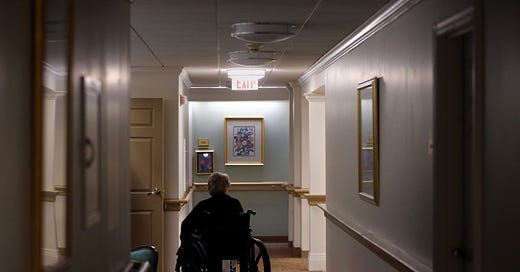
The Stakes for Caregivers This Election Day
I know firsthand how Kamala Harris’s ‘Medicare at Home’ proposal could ease the burden on the sandwich generation.
BACK IN AUGUST 2020, I was rewriting something for the Democratic National Convention, which was being held online because of the COVID pandemic. The sun had set. Cable news glowed in the background and the house was still except for the snoring of Grace, my Newfoundland. And then: “Boom!”
The whole house shook. Grace jumped from her slumber. I calmly hit save on my document because I knew the loud sound wasn’t a branch crashing on the back porch. It was my mother’s body hitting the floor.
As a caregiver, I had learned that distinct sound. The impact of a body produces a very particular rumble, as if elsewhere in your home, twenty people with mallets have simultaneously struck an array of orchestral bass drums. Even though my mother’s 75-year-old body with dementia was only five feet and five inches tall and about 126 pounds, it could shake a rental house. It did when she fell and broke her hip. It did at 2 a.m. when she forgot how to get from the bathroom back to her bed. It did when she misstepped while trying to maneuver her walker to sit at the kitchen table and doomscroll Instagram.
As I headed downstairs to her first-floor bedroom with an accessible bathroom—the feature that convinced me to rent this particular house—I prepared myself for what I might see. Would there be blood everywhere? Would I find her neck or legs at unnatural angles? Would she be unresponsive? I moved downstairs fast, my phone clutched in my hand, Grace by my side.
When I opened her bedroom door, the Weather Channel blasted the local radar update at me; my mom’s hearing was pretty much gone. She wasn’t screaming, at least. I turned the corner to her bathroom. The dusty and dog hair–covered tennis balls from her upturned walker were sticking out over her lower legs, making her feet seem a bit like the ruby red slippers poking out from under the house in The Wizard of Oz. My mother was flat on the floor. Her eyes opened. She twisted her glasses around the bridge of her nose.
“Ow,” she said.
“Be still,” I said.
I went to her and looked at her face-to-face and smiled. A few years earlier, I’d learned that talking to her directly and with a friendly face could help keep her mood stable.
“Do your legs hurt?” I asked.
“No,” she said. She smiled back.
“Can you feel this?” I asked and touched the sides of her arms.
“Yes,” she said. She started to move to sit up.
In my mind, I knew then that nothing was broken and she wasn’t paralyzed.
“Can I feel the back of your head?” I asked.
She nodded. I reached behind her and felt a tennis ball–sized lump. That lump meant she needed to go to the emergency room. I told her to sit still and ran upstairs. I was even smaller than my mother; I couldn’t lift her myself when she fell like this. I opened my older brother’s bedroom door. He, too, lives with a disability and had just taken his nightly medication.
Yes, I was a caregiver to two people in my family while trying to work full-time and have some kind of life. So, so many of us are in similar situations.
THAT AUGUST SCARE AT HOME, and the hospital visit that followed, was just another night in the life of a caregiver. I did it for almost ten years because even though my mother was a flawed mother—with part of her dementia coming from a frontal lobe destroyed by decades of doctors prescribing her Valium, Fioricet with codeine, Percocet, and Ativan—everyone deserves good and safe care. My brothers and I decided that I would be the primary caregiver until I physically couldn’t do it anymore. We saved as much money as possible because another classic sign of dementia is losing one’s money, and my mother had lost all of hers. We enrolled her in Massachusetts’s “Frail Elder Waiver” Program, which got my mother on MassHealth, the state’s Medicaid program. This meant that when she did have to go into a long-term care facility for safety, the total bill wouldn’t be so bad—it would still cost something like $20,000 a month, similar to the cost of professional, around-the-clock in-home care, but the total number of months would be shorter and the majority paid for by Masshealth.
Our plan worked, and she went into a facility at the end for fourteen months. While my savings went to zero, we didn’t go bankrupt, as many other families in situations like ours do.
The work I did as her caregiver and as my older brother’s saved my family almost $180,000 a year. And my situation and story are far from unique. Like others of the more than 50 million unpaid family caregivers in the United States who provide an estimated $600 billion in services each year, I gave up a lot, and I continue to live with the effects of the choices I have had to make. My career suffered because I couldn’t travel much for work. I had to take jobs that were fine with me working remotely, and those often paid less. I didn’t have family close by who could pitch in to support my mother’s daily care needs and give me breaks. In ten years, I’ve had three days off.
Unless you have millions, you can expect to have to make these kinds of choices with your loved one when it comes to caring for them later in life. A lifetime of work, a modest house, maybe a small pension or retirement: These can be wiped away quickly by the costs of hired home aides or residence in a specialized facility. Many of us are pushed to become caregivers by these realities. The care we provide our loved ones isn’t valued in this country even though we all need it at the beginning of our lives, many of us need it throughout, and most of us will need it again at the end. It’s a need that affects everyone, whether they are Democratic, Republican, independent, or anything else.
Which brings us to the 2024 presidential election.
The final days of any election are always hard; this one seems especially fraught following Donald Trump’s racist rally at Madison Square Garden. But if you’re struggling for a reason to engage, look at what this election could mean for caregivers.
Vice President Kamala Harris has a proposal to get in-home care covered in Medicare. This “Medicare at Home” plan would provide “coverage for those of modest incomes with a sliding scale for cost-sharing for seniors with higher incomes,” according to the campaign’s announcement. The costs of the program—suggested to be around $40 billion—would supposedly be offset by the savings gained from negotiating drug prices.
If a plan like this had been in place at the time when I was caring for my mother, it would have made my life easier. With the improved possibility of having consistent help, I might have taken jobs that would have pulled me away from home more often without having to worry about my mother’s safety in my absence. Maybe I wouldn’t have felt so worn down by trying to provide full-time care for two people while also working and trying to have a life. Maybe I wouldn’t have felt so alone on those nights when I heard my mother’s body hit the bathroom floor. Maybe.
Investing in home- and community-based services matters. Ten thousand Americans hit retirement age every day; in view of our aging population, expanding Medicare coverage to include in-home care makes good sense. We also need to pay living wages to the care workers who wash our moms, lift our dads, and sing to our spouses. The Biden-Harris administration made a regulatory change earlier this year concerning Medicaid recipients of home care. Under the new provision, by 2030,
a minimum of 80% of Medicaid payments for homemaker, home health aide, and personal care services [must] be spent on compensation for direct care workers furnishing these services, as opposed to administrative overhead or profit.
This change was one of a host of efforts by the Biden–Harris administration to ease burdens on caregivers, especially those in the “sandwich” generation caring for both younger and older dependents.
Harris’s new proposal would be a further step toward improving the lives of caregivers and putting more money in their pockets without requiring you to empty yours.
Care matters. And while it seems unlikely that this issue will register even as a blip in terms of how anyone will vote on Tuesday, it does highlight the very real stakes for tens of millions of Americans in this election. Harris is proposing a way to lighten the burdens of caregiving with a program that could make a huge difference in people’s lives—so that fewer families will have to listen for the sound of a loved one hitting the floor, then pray that it doesn’t break them.

















